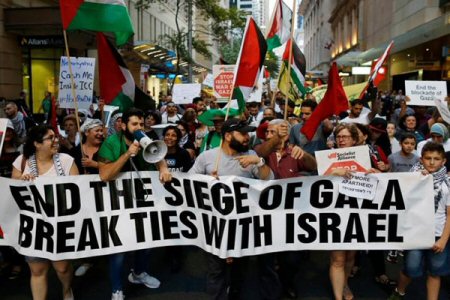www.aljazeerah.info
Opinion Editorials, April 2018
Archives
Mission & Name
Conflict Terminology
Editorials
Gaza Holocaust
Gulf War
Isdood
Islam
News
News Photos
Opinion Editorials
US Foreign Policy (Dr. El-Najjar's Articles)
www.aljazeerah.info
Palestinians in Gaza Deserve Our Support for Ending the 10-Year Brutal Israeli Blockade By James J Zogby Al-Jazeerah, CCUN, April 19, 2018 |
 |
 |
|
| Students at Sydney University demonstrating in support of Palestinians in Gaza, April 15, 2018 |
Gaza Is In Need of Our Support
To say that the situation in Gaza is deplorable and desperate is an understatement. That impoverished strip of land on the Eastern Mediterranean has been deplorable and desperate for decades.
I traveled to Gaza many times during the 1990's, in my capacity as co-Chair of Builders for Peace, which was a project launched by Vice President Al Gore to help grow the Palestinian economy. My colleagues and I were unprepared for what we found. Secretary of Commerce Ron Brown, who led one of these delegations, described what he saw as "worse than Soweto.
During the first quarter century of its occupation, Israel pursued a policy described by Sara Roy as the, de-development of Gaza. There was no investment in infrastructure, with the local population reduced to a cheap pool of labor working either as day laborers in Israel or as poorly paid sub-contractors working for Israeli exporters. The poverty of the place was palpable, as was the congestion. Gaza is among the most densely populated places on earth.
Because 70% of Gazans are refugees living in camps, they received education, some medical and social services thanks the UNWRA - the United Nations agency created to provide for Palestinian refugees. But not much more.
In Jabalya Camp, we saw little children walking through a pool of water in the middle of a dirt road. Since it hadn't rained in days, we asked about the source of the water and were horrified to learn that it was open sewage - the result of the fact that there were no paved roads in that part of the camp and no sewage system.
The Strip's best agricultural land had been taken by Israeli settlers. Palestinians who farmed on the land that remained had difficulty exporting their product unless they worked with Israeli middlemen reducing their ability to make a sustainable profit. We heard the same complaint from small manufacturers.
A number of the American business leaders that Builders for Peace brought on our visits were interested in investing and developing partnerships with Palestinian businesses but were discouraged from doing so when they learned that there would be restrictions on their ability to import raw materials and export finished products.
A visit to the border revealed the hardships faced by the tens of thousands of Gazans who relied on day labor employment in Israel. Because, by Israeli law they could not overnight in Israel and they were forced to leave their homes before dawn to get to the border before 6 am in hopes of being selected for a day's work in construction, agriculture, or janitorial services. The lucky ones were loaded on trucks taken to their jobs and, at the end of the day, they were driven back to the border. Exhausted, they got home late at night to sleep and then to repeat the process the next day.
In 1996, I was honored to be a part of the Carter Center's team monitoring the first Palestinian election. The lines of voters were long and the excitement was real. I documented poignant scenes of men and women spending long hours waiting for their chance to cast their first-ever ballots in an election they believed was to be the first step to independence.
The last time I went to Gaza during the Clinton Administration, I accompanied President Clinton as he addressed a meeting of the Palestine National Council and cut the ribbon opening Gaza's new airport. Despite Palestinian (and US) frustration with the Netanyahu government's declared intention to end the Oslo peace process, there was still hope in the air.
As desperate and deplorable as conditions were in Gaza back then, in many ways, those were the "good years."
Likud hardline policies, violence, and provocation, coupled with Hamas' instigated acts of terrorism served to make a bad situation worse. Ariel Sharon's decision to unilaterally withdraw from Gaza and his refusal (despite US Secretary of State Condoleza Rice's entreaties) to allow for an orderly hand-off of the administration of the Strip to the Palestinian Authority, paved the way for an eventual Hamas take-over.
What followed was a complete Israeli blockade of Gaza, creating even greater Palestinian impoverishment. Three punishing Israeli wars on Gaza (in 2008, 2012, and 2014) left over 3,800 Palestinians dead, 15,000 wounded, and an already dilapidated infrastructure even more devastated by deliberate Israeli targeting of civilian sites, like a sewage reservoir and a chicken processing plant. In all three wars, there was clear evidence that Israel committed war crimes.
The blockade was especially cruel with the Israelis allowing in only enough food to provide for the minimum caloric intake to sustain life and no support to infrastructure repair. Ninety-five percent of Gaza's water is contaminated and undrinkable and most residents receive only between two to four hours of electricity daily. Poverty levels have reached extreme levels as has unemployment. For the last three decades, youth unemployment has hovered between 70% to 80% - meaning that most young Palestinians in Gaza have never had a job and have no prospect of a job. It breaks my heart when I read of the despair of a young protester in Gaza who was recently quoted saying "No peace, no jobs, no unity, and no future, so what difference would death make? If we are going to die, then let it not be in vain."
To their credit, the people of Gaza have during the past three weeks embarked on a mass non-violent protest, terming it the "Great March of Return". Fearing a non-violent mass movement, the Israelis have, true to form, responded with overwhelming violence, while attempting to cover their unconscionable behavior with denial and deceit. They positioned 100 snipers on earthen mounds on their side of the border and during the past three weeks, they have shot and killed 32 Palestinian protesters, wounding another 1,300.
While the Israelis have claimed that those whom they shot were threatening to breach the border, Israeli human rights groups have documented that the overwhelming majority of those hit were hundreds of yards from the border fence and even those few whom the Israelis said were throwing incendiary devices were over one hundred yards away - their action being more symbolic then threatening.
The entire affair has been more like a "turkey shoot" then a military confrontation, with innocent protesters who are captives in the world's largest open air prison being randomly picked off by sniper fire. Even more sickening was the recently released video of a sniper shooting and hitting a Palestinian while his fellow snipers cheered his success. The Israeli response to this video has been to call for punishing the maker of the video and not the sniper who killed the unarmed protester.
Some have dismissed the entire "Great March" as a Hamas ploy. But such a charge is both patently false and cruel. The effort was launched by civil society and while Hamas has embraced it, it should be endorsed by all Palestinian factions and not left to Hamas to be the effort's only sponsor.
When Palestinians use non-violent means to make their case, whether in mass mobilizations or through the BDS movement, they should be encouraged and supported. To deny them this right is to say that they have no right to protest their conditions and they should, as one Israeli leader has cruelly suggested, "go home and get on with their lives."
In the weeks ahead, I hope to see Palestinians in the West Bank and Jerusalem, and Palestinians in Lebanon and Jordan join this "Great March." Attention must be paid to this long-suffering people, whether they be the desperate in Gaza, or their compatriots who also long for and deserve that the world acknowledge their right to be recognized as equal human beings.
***
Share the link of this article with your facebook friends
|
|
|
|
||
|
||||||


